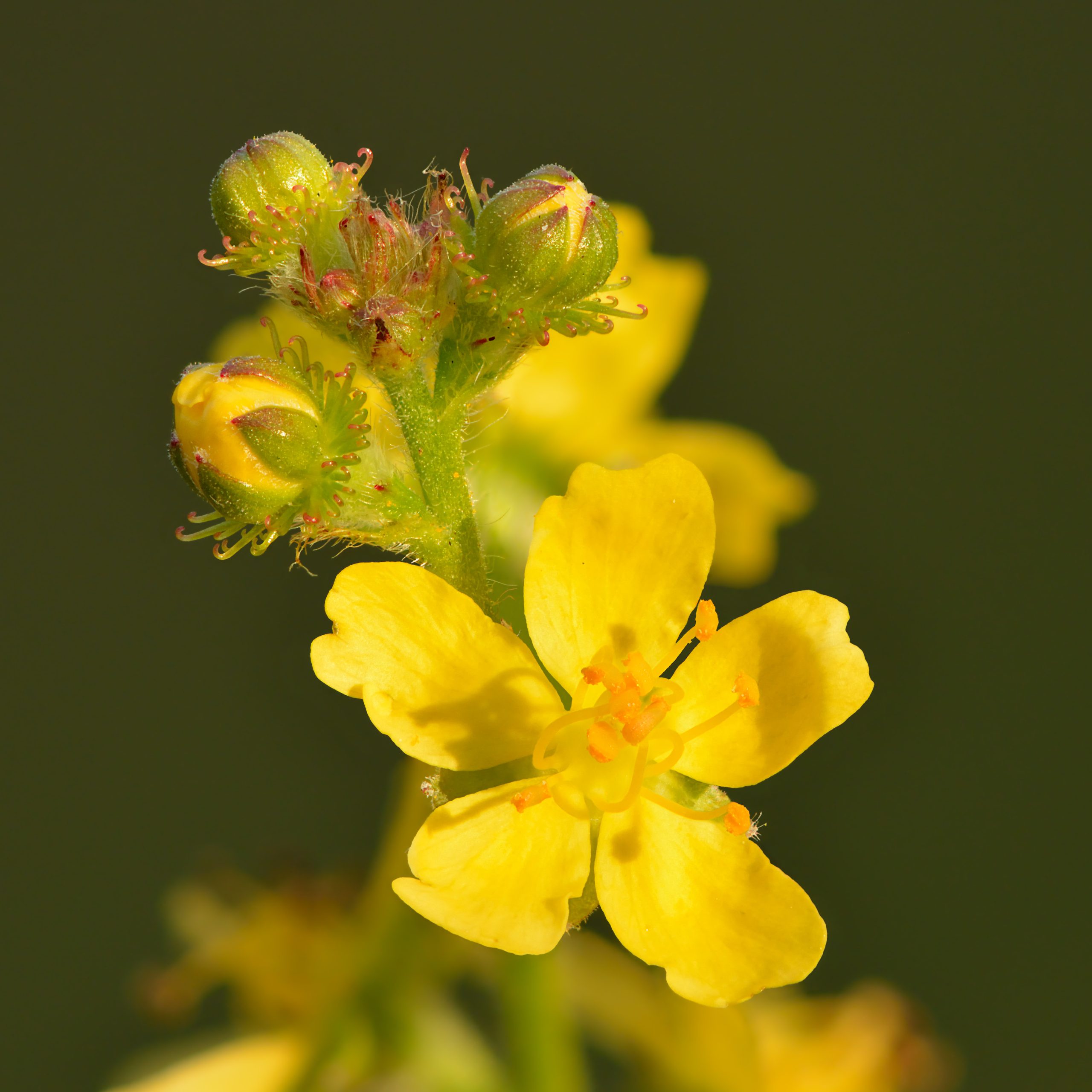Common Names and Other Names:
- Agrimony
- Church Steeples
- Cockleburr
- Stickwort
- Philanthropos
- Garclive
Where Does It Occur:
Agrimony is native to:
- Europe
- Western Asia
- North Africa
It has also been naturalized in:
- North America
Agrimony typically grows in:
- Meadows
- Hedges
- Roadsides
- Woodland edges
- Grasslands
It thrives in well-drained soils and can tolerate both full sun and partial shade.
Basic Ingredients (Constituents):
Agrimony contains several bioactive compounds:
- Tannins:
- Responsible for its astringent properties.
- Flavonoids:
- Quercetin
- Kaempferol
- Apigenin
- Phenolic Acids:
- Ellagic Acid
- Caffeic Acid
- Volatile Oils
- Silicic Acid
- Bitters
- Coumarins
These constituents contribute to agrimony’s anti-inflammatory, antioxidant, astringent, and mild diuretic effects.
Most Commonly Used For Treatment Of:
- Digestive Disorders:
- Diarrhea: Due to its astringent properties, agrimony can help reduce diarrhea.
- Indigestion: May alleviate gastrointestinal discomfort.
- Respiratory Issues:
- Sore Throat and Laryngitis: Used as a gargle to soothe throat irritation.
- Coughs: Helps in relieving mild respiratory symptoms.
- Skin Conditions:
- Minor Wounds and Cuts: Promotes healing and reduces bleeding.
- Eczema and Skin Irritations: Applied topically to soothe inflamed skin.
- Urinary Tract Issues:
- Acts as a mild diuretic, aiding in urinary health.
- Liver and Gallbladder Support:
- Traditionally used to support liver function and bile flow.
- Hemorrhoids:
- Applied externally to reduce swelling and discomfort.
Side Effects:
Agrimony is generally considered safe when used appropriately, but potential side effects may include:
- Gastrointestinal Upset:
- Nausea or stomach discomfort, especially when taken in large doses.
- Allergic Reactions:
- Skin rash or irritation in sensitive individuals.
- Interaction with Medications:
- Anticoagulants: May affect blood clotting due to tannin content.
- Antihypertensive Drugs: Could enhance the effect of blood pressure medications.
- Photosensitivity:
- Rare cases of increased sensitivity to sunlight.
Available Forms in the Market:
- Dried Herb:
- Used to prepare teas, infusions, or decoctions.
- Tinctures and Liquid Extracts:
- Alcohol-based extracts for internal use.
- Capsules/Tablets:
- Contain powdered agrimony for convenient dosing.
- Topical Preparations:
- Creams, ointments, or salves for skin applications.
- Gargles and Mouthwashes:
- Prepared from the herb for sore throat relief.
- Essential Oil:
- Used in aromatherapy (less common).
Research and Results:
- Antioxidant Properties:
- Study: A study published in the Journal of Agricultural and Food Chemistry investigated the antioxidant activity of agrimony extracts.
- Findings: The research demonstrated that agrimony has significant antioxidant effects due to its high content of phenolic compounds and flavonoids.
- Anti-inflammatory Effects:
- Study: Research featured in the Journal of Ethnopharmacology evaluated the anti-inflammatory properties of agrimony.
- Findings: The study showed that agrimony extracts reduced inflammation markers in animal models, suggesting potential benefits for inflammatory conditions.
- Antimicrobial Activity:
- Study: An article in Fitoterapia assessed the antimicrobial effects of agrimony extracts.
- Findings: Results indicated that agrimony exhibited inhibitory effects against various bacterial strains, including Staphylococcus aureus and Escherichia coli.
- Digestive Health:
- Study: A study in Phytotherapy Research examined the antidiarrheal activity of agrimony.
- Findings: The research concluded that agrimony possesses antidiarrheal properties, likely due to its tannin content, which has astringent effects.
Precautions:
- Pregnancy and Breastfeeding:
- Use with Caution: Insufficient reliable information is available; consult a healthcare provider before use.
- Bleeding Disorders:
- Avoid Use: May affect blood clotting; not recommended for individuals with bleeding disorders or those taking anticoagulant medications.
- Diabetes:
- Monitor Blood Sugar: May lower blood sugar levels; diabetics should monitor levels closely.
- Scheduled Surgery:
- Discontinue Use: Stop using agrimony at least two weeks before surgery due to potential effects on blood clotting and blood sugar levels.
- Medication Interactions:
- Anticoagulants and Antiplatelet Drugs: May increase bleeding risk.
- Antihypertensive Medications: Could enhance the effects of blood pressure-lowering drugs.
- Diabetic Medications: May amplify hypoglycemic effects.
- Allergies:
- Individuals allergic to plants in the Rosaceae family (e.g., roses, apples) should exercise caution.
Conclusion:
Agrimony is a traditional medicinal herb valued for its astringent, anti-inflammatory, and antioxidant properties. It has been historically used to treat digestive issues, sore throats, skin conditions, and support liver health. While generally safe for most adults when used appropriately, it’s important to be aware of potential side effects and interactions with medications. Consulting with a healthcare professional before incorporating agrimony into your regimen is advisable, especially if you have underlying health conditions or are taking other medications.
« Back to Glossary Index
